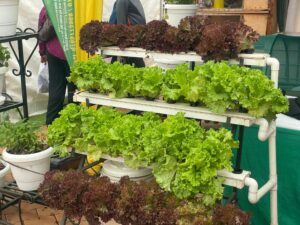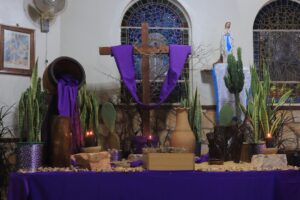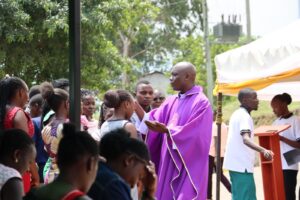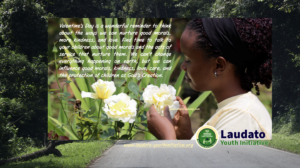By Laudato Voices | COP30- From Words to Action | November 15, 2025
Around the world today, conversations about climate change are everywhere, at conferences, in classrooms, on social media, in community gatherings etc. We discuss rising temperatures, disappearing forests, polluted air, and the urgent need to act. We create programs, write reports, and draft policies. Yet despite all these words, young people continue to ask a critical question: Where are the role models who are truly living the change they speak of?
For many youths, the gap between talk and action has never felt wider. They listen to speeches about sustainability, but in their own neighborhoods they see inconsistent practices, unfulfilled promises, and a world still moving toward ecological breakdown. What they long for is not more theory, but real, visible steps, efforts that begin small but ripple outward, uniting communities and building a culture of environmental responsibility. That is our goal in Laudato Si Clubs. Let actions Speak.
Why Role Models Matter
Young people learn best not by being told what to do, but by witnessing what is possible. A teacher who plants a school garden, a farmer who shifts to regenerative practices, a parish that starts a recycling program, a family that reduces single-use plastics, these are the examples that spark transformation. They show that climate action is not only for experts or policymakers; it is for everyone.
Role models give hope. They show that change is achievable, that impact begins with intention, and that leadership often starts with the simplest of acts: planting a tree, organizing a cleanup, educating peers, or choosing sustainable habits.
Small Actions, Big Impact
The climate crisis can feel overwhelming, especially for the youth who will inherit its consequences. But when they see individuals and communities taking small, consistent steps, it helps them understand that the path to a healthier planet is not paved with one dramatic leap, it is built through countless everyday choices.
- A community or institutions that learns to compost reduces waste – Saying no to single use plastics
- A group of students that saves water and electricity, institutions that install water-harvesting tanks, solar systems and conserves resources.
- A parishes and organisations that switches to solar energy inspiring and supporting households to follow.
- A neighborhood that plants indigenous and fruit trees restores biodiversity.
- Communities that care for young people and the poor
- Each action, however modest, becomes a seed of hope.
A Call to Those Already Taking Action
To those who are quietly working, cleaning rivers, restoring wetlands, conserving energy, teaching environmental responsibility, or mobilizing local initiatives, your example is needed now more than ever. Young people need to hear your stories. They need to see your struggles, your progress, your creativity, and your courage. These stories are not just inspiring; they are instructional. They guide others on how to begin, how to persist, and how to build community-driven solutions.
The Path Forward
Our plea is simple: let this be the moment we move from talking about climate change to living the solutions. Let this be the time when communities step forward, not merely with plans, but with practice. Let this be the age when young people grow up surrounded not by despair, but by examples of determined, hopeful action.
Words may guide us, but only actions will save us and the next generation is watching eager, ready, and searching for leaders who show them the way. Our Message for COPs has always been the same. The international response to the climate crisis needs to bridge the gap between Cop summits and the experience of those who face its consequences. It must ignite hope for a climate-resilient generation














